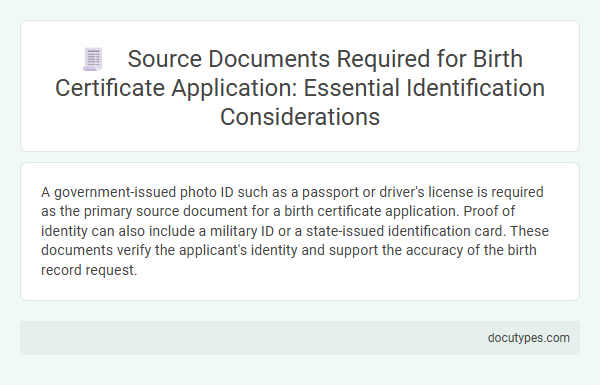A government-issued photo ID such as a passport or driver's license is required as the primary source document for a birth certificate application. Proof of identity can also include a military ID or a state-issued identification card. These documents verify the applicant's identity and support the accuracy of the birth record request.
Introduction to Birth Certificate Source Documents
Applying for a birth certificate requires submitting specific source documents that verify identity and birth details. These documents serve as official proof to ensure the accuracy and legitimacy of the information provided.
Common source documents include hospital birth records, parental identification, and immunization records. Understanding which documents are accepted helps streamline the application process and avoid delays.
Importance of Proper Identification in Birth Registration
Proper identification is essential when applying for a birth certificate to verify the individual's identity and ensure accurate registration. Source documents provide the legal proof necessary to establish authenticity and prevent errors or fraud in birth records.
- Government-issued Photo ID - A valid driver's license or passport confirms the identity of the applicant or parent.
- Hospital Records - Birth notifications or delivery certificates from medical facilities validate birth details.
- Parental Identification - Official IDs of the parents help verify family relationships and support the child's registration.
Submitting the correct source documents streamlines the birth certificate application and maintains the integrity of vital records.
Primary Identification Documents for Birth Certificate Application
What source document is needed for a birth certificate application? A primary identification document is required to verify the applicant's identity and eligibility. Common primary documents include government-issued photo IDs such as a passport or driver's license, which must be current and valid.
Secondary Supporting Documents: What May Be Needed
Secondary supporting documents are often required to verify information during a birth certificate application. These documents complement the primary source document and help establish identity, parentage, or residency.
Common secondary supporting documents include school records, hospital birth records, or immunization certificates. In some cases, affidavits from relatives or legal guardians may also be accepted. Requirements vary by jurisdiction, so it is important to check local guidelines before submission.
Parent(s) Proof of Identity and Relationship
When applying for a birth certificate, providing proof of identity and relationship of the parent(s) is essential. This ensures the accuracy and legitimacy of the application process.
- Parent(s) Government-Issued ID - A valid government-issued identification, such as a driver's license or passport, must be submitted to verify the parent(s) identity.
- Proof of Relationship - Documents like a marriage certificate or legal custody papers demonstrate the relationship between the parent(s) and the child.
- Additional Supporting Documents - Court orders or affidavits may be requested to further confirm parental rights or guardianship when applicable.
Hospital or Medical Records as Source Documentation
| Source Document Type | Description | Purpose in Birth Certificate Application |
|---|---|---|
| Hospital Records | Official records maintained by the hospital where the birth occurred, including delivery details, medical staff signatures, and baby identification. | These records confirm birth details required for issuing a birth certificate, such as date, time, place, and parent information. |
| Medical Records | Comprehensive healthcare documentation related to childbirth, which may include prenatal, delivery, and postnatal care details from licensed medical providers. | Medical records serve as verified proof of birth information that supports the application process for a birth certificate. |
| Why These Documents Matter | Your birth certificate application must include hospital or medical records to ensure authenticity and accuracy of the birth data reported to government authorities. These documents act as primary evidence during identity verification. | |
Affidavits and Notarized Statements for Special Cases
Affidavits and notarized statements play a crucial role in birth certificate applications when standard documents are unavailable. These legal declarations serve as credible substitutes to verify identity and birth details.
An affidavit from a close family member or a responsible adult can attest to the birth facts in special cases. Notarized statements must comply with local regulations to ensure the application is accepted by the vital records office.
Dealing with Missing or Unavailable Source Documents
Source documents required for a birth certificate application typically include a hospital birth record, parental identification, or a government-issued document verifying the birth. When these documents are missing or unavailable, you must provide alternative evidence such as affidavits from parents or witnesses, medical records, or a delayed registration form. Local vital records offices often offer tailored guidance on acceptable substitutes to ensure the successful processing of your application.
Legal Requirements and Regional Variations in Documentation
To apply for a birth certificate, official source documents such as a hospital birth record, a notarized affidavit from a midwife, or an official birth notification form are typically required, depending on the jurisdiction. Legal requirements mandate proof of the child's identity and parental details, which may vary significantly by region, with some areas demanding additional documents like marriage certificates or government-issued IDs. You should verify specific regional guidelines to ensure all necessary documentation meets local legal standards for successful birth certificate application processing.
What Source Document Is Needed for Birth Certificate Application? Infographic

